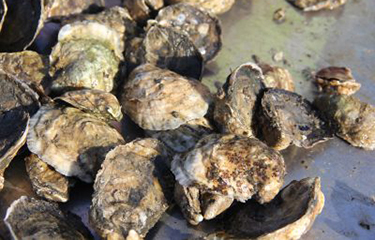The U.S. Food and Drug Administration has issued a warning about oysters from an area of the U.S. state of Connecticut.
The FDA is advising consumers not to eat – and restaurants and food retailers not to sell – oysters harvested from the Groton approved area in Connecticut from 28 August through 30 August from dealers CT-393-SS, AQ, CT-004-SS, AQ, and CT-020-SS, AQ with lots, L-30 and L-26B1.
Sample results from those dealers and lots showed potential contamination of E.coli and salmonella, the FDA said. The Connecticut Department of Agriculture, Bureau of Aquaculture initiated an emergency precautionary closure of two approved harvest areas and a recall on 31 August.
All of the impacted commercial harvesters agreed to voluntarily recall product harvested from the area, the FDA said.
“The affected area will remain closed until the source of contamination is identified and corrected, and the Connecticut Department of Agriculture has collected acceptable sample results to reopen the area,” the agency said.
The oysters were directly distributed to retailers and distributors in the U.S. states of Connecticut, Massachusetts, New York, Pennsylvania and Virginia. Oysters may have been distributed beyond those states; The FDA is still investigating.
In New York, the oysters were distributed to Lockwood, Winant Seafood, Montauk Seafood, and Bronx Fish. In Pennsylvania, they were distributed to Samuels and Sons Seafood; in Massachusetts, they were delivered to Pangea; in Connecticut, they were distributed to CT Shellfish Gulf Shrimp, Cityline, and Seawell; and in Maryland, they were delivered to Sam Rust.
“Contaminated oysters can cause illness, especially if eaten raw, particularly in people with compromised immune systems,” the FDA said. “Food contaminated with pathogens may look, smell, and taste normal.
The warning follows a separate notice from the FDA, issued 21 August, warning about potential salmonella and E.coli in cultured mussels from Glenfinnan, Prince Edward Island, Canada-based East River Shellfish.
The FDA notification came after the Canadian Food Inspection Agency (CFIA) tested mussel meats and discovered the presence of salmonella and high levels of generic E. coli East River Shellfish harvested 14 August from the PE 4-C growing zone. The mussels were shipped on 15 August and distributed to retailers in the U.S. states of Illinois, Massachusetts, and New York.
And separately, three people died in the New York City area in August from vibriosis, an infection caused by eating raw oysters with or swimming in saltwater. A fourth person was hospitalized with serious symptoms of vibriosis, which include diarrhea, stomach cramps, vomiting, fever and chills, and several other people who ate oysters contaminated with Vibrio vulnificus were sickened, according to The New York Times.
A representative with the Connecticutt Department of Health later confirmed to SeafoodSource that two of hte three infections were not associated with seafood, and the third infection was caused by raw oysters harvested outside of Long Island Sound.
The outbreak came even after Connecticut implemented rules about the storage and freezing of oysters after a similar bacterial strain, Vibrio parahaemolyticus, sickened 23 people in 2013.
Photo courtesy of Connecticut Sea Grant







